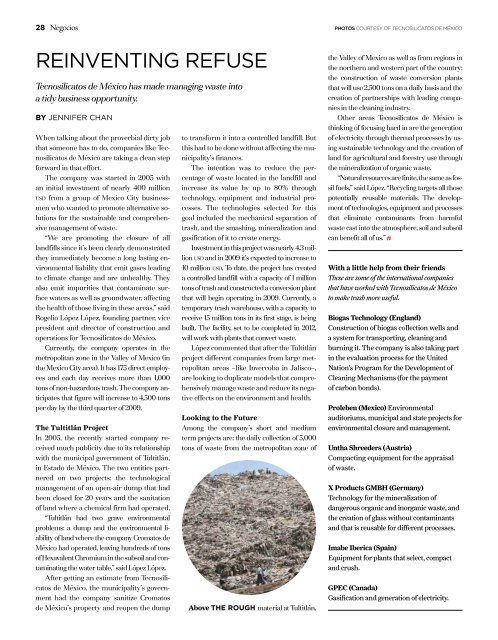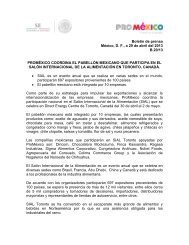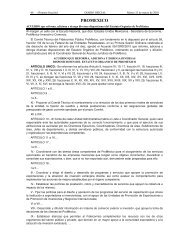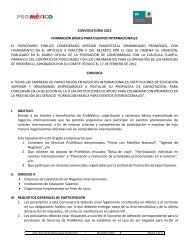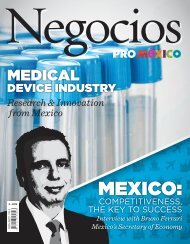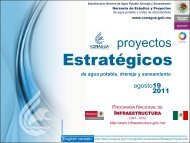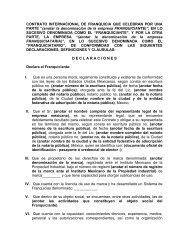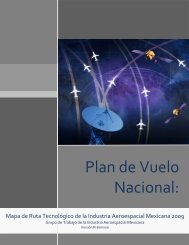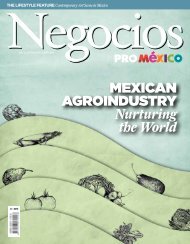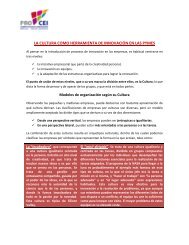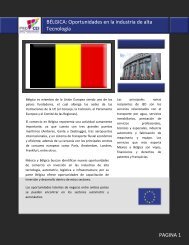GREEN ROOF EFFECT - ProMéxico
GREEN ROOF EFFECT - ProMéxico
GREEN ROOF EFFECT - ProMéxico
You also want an ePaper? Increase the reach of your titles
YUMPU automatically turns print PDFs into web optimized ePapers that Google loves.
28 Negocios photos courtesy of tecnosilicatos de méxico<br />
Reinventing refuse<br />
Tecnosilicatos de México has made managing waste into<br />
a tidy business opportunity.<br />
By Jennifer Chan<br />
When talking about the proverbial dirty job<br />
that someone has to do, companies like Tecnosilicatos<br />
de México are taking a clean step<br />
forward in that effort.<br />
The company was started in 2005 with<br />
an initial investment of nearly 400 million<br />
usd from a group of Mexico City businessmen<br />
who wanted to promote alternative solutions<br />
for the sustainable and comprehensive<br />
management of waste.<br />
“We are promoting the closure of all<br />
landfills since it’s been clearly demonstrated<br />
they immediately become a long lasting environmental<br />
liability that emit gases leading<br />
to climate change and are unhealthy. They<br />
also emit impurities that contaminate surface<br />
waters as well as groundwater, affecting<br />
the health of those living in these areas,” said<br />
Rogelio López López, founding partner, vice<br />
president and director of construction and<br />
operations for Tecnosilicatos de México.<br />
Currently, the company operates in the<br />
metropolitan zone in the Valley of Mexico (in<br />
the Mexico City area). It has 175 direct employees<br />
and each day receives more than 1,000<br />
tons of non-hazardous trash. The company anticipates<br />
that figure will increase to 4,500 tons<br />
per day by the third quarter of 2009.<br />
The Tultitlán Project<br />
In 2005, the recently started company received<br />
much publicity due to its relationship<br />
with the municipal government of Tultitlán,<br />
in Estado de México. The two entities partnered<br />
on two projects: the technological<br />
management of an open-air dump that had<br />
been closed for 20 years and the sanitation<br />
of land where a chemical firm had operated.<br />
“Tultitlán had two grave environmental<br />
problems: a dump and the environmental liability<br />
of land where the company Cromatos de<br />
México had operated, leaving hundreds of tons<br />
of Hexavalent Chromium in the subsoil and contaminating<br />
the water table,” said López López.<br />
After getting an estimate from Tecnosilicatos<br />
de México, the municipality’s government<br />
had the company sanitize Cromatos<br />
de México’s property and reopen the dump<br />
to transform it into a controlled landfill. But<br />
this had to be done without affecting the municipality’s<br />
finances.<br />
The intention was to reduce the percentage<br />
of waste located in the landfill and<br />
increase its value by up to 80% through<br />
technology, equipment and industrial processes.<br />
The technologies selected for this<br />
goal included the mechanical separation of<br />
trash, and the smashing, mineralization and<br />
gasification of it to create energy.<br />
Investment in this project was nearly 4.3 million<br />
usd and in 2009 it’s expected to increase to<br />
10 million usd. To date, the project has created<br />
a controlled landfill with a capacity of 1 million<br />
tons of trash and constructed a conversion plant<br />
that will begin operating in 2009. Currently, a<br />
temporary trash warehouse, with a capacity to<br />
receive 15 million tons in its first stage, is being<br />
built. The facility, set to be completed in 2012,<br />
will work with plants that convert waste.<br />
López commented that after the Tultitlán<br />
project different companies from large metropolitan<br />
areas –like Invercoba in Jalisco–,<br />
are looking to duplicate models that comprehensively<br />
manage waste and reduce its negative<br />
effects on the environment and health.<br />
Looking to the Future<br />
Among the company’s short and medium<br />
term projects are: the daily collection of 5,000<br />
tons of waste from the metropolitan zone of<br />
Above The rough material at Tultitlán.<br />
the Valley of Mexico as well as from regions in<br />
the northern and western part of the country;<br />
the construction of waste conversion plants<br />
that will use 2,500 tons on a daily basis and the<br />
creation of partnerships with leading companies<br />
in the cleaning industry.<br />
Other areas Tecnosilicatos de México is<br />
thinking of focusing hard in are the generation<br />
of electricity through thermal processes by using<br />
sustainable technology and the creation of<br />
land for agricultural and forestry use through<br />
the mineralization of organic waste.<br />
“Natural resources are finite, the same as fossil<br />
fuels,” said López. “Recycling targets all those<br />
potentially reusable materials. The development<br />
of technologies, equipment and processes<br />
that eliminate contaminants from harmful<br />
waste cast into the atmosphere, soil and subsoil<br />
can benefit all of us.” n<br />
With a little help from their friends<br />
These are some of the international companies<br />
that have worked with Tecnosilicatos de México<br />
to make trash more useful.<br />
Biogas Technology (England)<br />
Construction of biogas collection wells and<br />
a system for transporting, cleaning and<br />
burning it. The company is also taking part<br />
in the evaluation process for the United<br />
Nation’s Program for the Development of<br />
Cleaning Mechanisms (for the payment<br />
of carbon bonds).<br />
Proleben (Mexico) Environmental<br />
auditoriums, municipal and state projects for<br />
environmental closure and management.<br />
Untha Shreeders (Austria)<br />
Compacting equipment for the appraisal<br />
of waste.<br />
X Products GMBH (Germany)<br />
Technology for the mineralization of<br />
dangerous organic and inorganic waste, and<br />
the creation of glass without contaminants<br />
and that is reusable for different processes.<br />
Imabe Iberica (Spain)<br />
Equipment for plants that select, compact<br />
and crush.<br />
GPEC (Canada)<br />
Gasification and generation of electricity.


